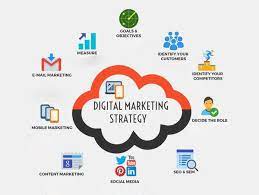The Importance of Online Marketing for Law Firms
Online marketing has become increasingly crucial for law firms looking to attract new clients and grow their business. With the majority of people turning to the internet to find legal services, having a strong online presence is essential in today’s digital age.
Here are some key strategies that law firms can use to effectively market themselves online:
- Search Engine Optimization (SEO): Optimizing your website with relevant keywords and high-quality content can help improve your search engine rankings, making it easier for potential clients to find you online.
- Content Marketing: Creating informative blog posts, articles, and videos can showcase your expertise and establish credibility with potential clients. Providing valuable content can also help drive traffic to your website.
- Social Media Marketing: Engaging with your audience on social media platforms such as Facebook, Twitter, and LinkedIn can help increase brand awareness and foster relationships with potential clients.
- Email Marketing: Sending targeted email campaigns to current and prospective clients can help keep your firm top of mind and drive conversions.
- Online Advertising: Utilizing pay-per-click (PPC) advertising on platforms like Google Ads can help you reach a wider audience and generate leads for your firm.
In conclusion, online marketing is an essential tool for law firms looking to stand out in a competitive market. By implementing these strategies effectively, law firms can attract new clients, build brand awareness, and ultimately grow their business in the digital age.
6 Key Benefits of Online Marketing for Law Firms
- Increased visibility
- Targeted advertising
- Cost-effective
- Enhanced brand awareness
- Measurable results
- Increased client engagement
5 Drawbacks of Online Marketing for Law Firms: Competition, Time, Compliance, Cost, and Feedback Risks
- 1. High Competition
- 2. Time-Consuming
- 3. Compliance Challenges
- 4. Costly Investment
- 5. Negative Feedback Exposure
Increased visibility
Increased visibility is a significant advantage of online marketing for law firms. By utilizing various digital marketing strategies such as search engine optimization (SEO), content marketing, social media marketing, and online advertising, law firms can expand their reach and attract a larger audience. This increased visibility not only helps in reaching potential clients who are actively seeking legal services online but also enhances the firm’s overall presence in the competitive digital landscape. By improving their visibility online, law firms can effectively position themselves as industry leaders and stand out from the competition.
Targeted advertising
One significant advantage of online marketing for law firms is the ability to utilize targeted advertising strategies. By leveraging online marketing campaigns, law firms can tailor their messaging to specific demographics and geographic locations, ensuring that they reach the right audience with their services. This precision in targeting not only helps law firms maximize the effectiveness of their marketing efforts but also increases the likelihood of connecting with potential clients who are more likely to convert into leads or clients.
Cost-effective
Online marketing for law firms offers a significant advantage in terms of cost-effectiveness when compared to traditional marketing methods. By leveraging online platforms and strategies, law firms can reach a larger audience at a fraction of the cost of traditional advertising. This cost-effective approach not only helps in reducing marketing expenses but also provides a higher return on investment, making it an attractive option for law firms looking to maximize their marketing budget efficiently.
Enhanced brand awareness
Enhanced brand awareness is a significant benefit of online marketing for law firms. By maintaining consistent online marketing efforts, law firms can effectively showcase their expertise, services, and values to a broader audience. This helps in building trust with potential clients and establishing the firm as a reputable industry leader. Through strategic online marketing initiatives such as content creation, social media engagement, and search engine optimization, law firms can strengthen their brand presence and differentiate themselves in a competitive market.
Measurable results
One significant advantage of online marketing for law firms is the ability to achieve measurable results. Online marketing tools offer detailed analytics that enable law firms to monitor the effectiveness of their campaigns and make informed, data-driven decisions. By analyzing key performance indicators such as website traffic, conversion rates, and engagement metrics, law firms can gain valuable insights into the success of their online marketing efforts and optimize their strategies for maximum impact. This level of measurability empowers law firms to track their ROI accurately and continuously improve their online marketing performance.
Increased client engagement
One significant advantage of online marketing for law firms is the increased client engagement it offers. By utilizing social media platforms, email campaigns, and other online channels, law firms can interact with clients in real-time, fostering stronger relationships and building trust. This direct engagement allows for timely communication, personalized interactions, and the opportunity to address client concerns promptly, ultimately enhancing the overall client experience and satisfaction.
1. High Competition
In the realm of online marketing for law firms, a significant drawback is the intense competition that exists within the digital landscape. The saturated market makes it exceptionally challenging for firms to distinguish themselves and capture the attention of their target audience amidst a sea of competitors all vying for visibility and engagement. The high level of competition underscores the importance of implementing strategic and innovative marketing tactics to effectively differentiate one’s firm and carve out a unique niche in the fiercely competitive online sphere.
2. Time-Consuming
One significant drawback of online marketing for law firms is its time-consuming nature. Effectively managing online marketing campaigns demands a considerable amount of time and effort, as continuous monitoring and optimization are essential for success. From creating content to analyzing data and adjusting strategies, the ongoing commitment required for online marketing can be a challenge for busy law firms focused on serving their clients’ legal needs.
3. Compliance Challenges
Law firms face compliance challenges when it comes to online marketing, as they must adhere to strict regulations and ethical considerations. These constraints can restrict the marketing strategies that law firms can employ, making it challenging for them to effectively promote their services online. Navigating these regulatory hurdles requires careful attention to detail and a deep understanding of the legal landscape, adding an extra layer of complexity to their marketing efforts.
4. Costly Investment
One significant drawback of online marketing for law firms is the costly investment it requires. Implementing a comprehensive online marketing strategy can quickly add up in expenses, particularly when considering the costs associated with advertising campaigns, creating high-quality content, and hiring SEO services to improve search engine rankings. For smaller law firms with limited budgets, these expenses can pose a significant financial challenge and may deter them from fully embracing online marketing as a viable strategy for growth.
5. Negative Feedback Exposure
One significant con of online marketing for law firms is the exposure to negative feedback. In today’s digital landscape, where online reviews and social media platforms are prevalent, law firms are at risk of receiving unfavorable feedback that could potentially harm their reputation if not handled effectively. Managing and responding to negative feedback promptly and professionally is essential to mitigate any potential damage to the firm’s image and credibility in the eyes of prospective clients.




